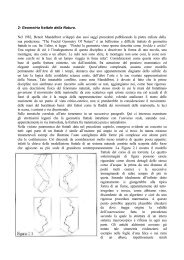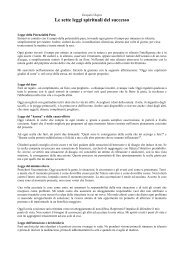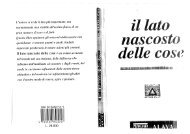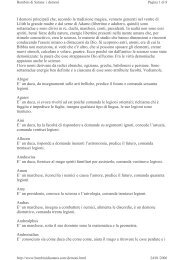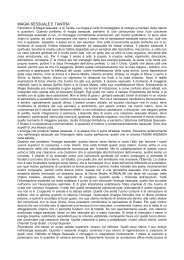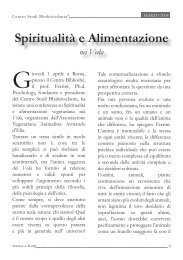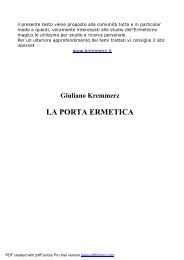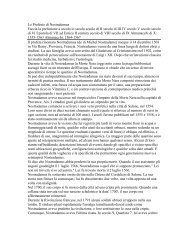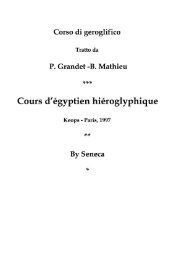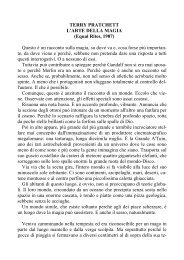Yale University Press NEW HAVEN & 9 780300"089028 - Sito Mistero
Yale University Press NEW HAVEN & 9 780300"089028 - Sito Mistero
Yale University Press NEW HAVEN & 9 780300"089028 - Sito Mistero
- No tags were found...
You also want an ePaper? Increase the reach of your titles
YUMPU automatically turns print PDFs into web optimized ePapers that Google loves.
202 TALIBAN SHIA VERSUS SUNNI: IRAN AND SAUDI ARABIA 203Taliban leader Mullah Rabbani met with King Fahd in Riyadh and praisedthe Saudis effusively. 'Since Saudi Arabia is the centre of the Muslimworld we would like to have Saudi assistance. King Fahd expressed happinessat the good measures taken by the Taliban and over the impositionof Sharia in our country,' Rabbani said. 13 Meeting King Fahd five monthslater, Taliban leaders said the Saudis had promised more aid. 'King Fahdwas too kind. The Saudis have promised us as much as they can give us,'said Mullah Mohammed Stanakzai. 14Riyadh's support for the Taliban made them extremely reluctant toexert any pressure on the Taliban to deport Osama Bin Laden, eventhough the USA was urging them to do so. Only when Prince Turki waspersonally insulted by Mullah Omar in Kandahar did the Saudis curtaildiplomatic links with the Taliban. Significantly, it was a personal insultthat guided Saudi decision-making rather than an overall change in foreignpolicy. Saudi Arabia still appeared to have learnt little from its negativeexperiences of trying to export Wahabbism.Saudi Arabia's initial support for the Taliban convinced Iran that theUSA was also backing them in an intensification of its 1980s policies tosurround Iran with hostile forces and isolate it. The USA, according toTehran, had a new aim to promote oil and gas pipelines from CentralAsia which would bypass Iran. After the Taliban captured Kabul, Iraniannewspapers echoed the long-held views of officials. 'The Taliban captureof Kabul was designed by Washington, financed by Riyadh and logisticallysupported by Islamabad,' wrote the Jomhuri Islami newspaper. 15However, for Tehran the real fall-out with Afghanistan was internal.The leadership was divided between hardliners, who still hankered aftersupporting Shias worldwide and moderates who wanted a more measuredsupport for the anti-Taliban alliance and less confrontation with the Taliban.Iran suffered from the same problems as Pakistan in having multipledepartments and lobbies trying to push their personal vested interests inthe making of Afghan policy. The Iranian military, the RevolutionaryGuards, the intelligence agencies, the Shia clergy and the powerful Bunyadsor Foundations which are run by the clergy and control much of thestate sector economy and also finance foreign policy adventures with theirlarge, unaccounted funds, were just some of the contending lobbies.All these lobbies had to be kept on an even keel by the Foreign Ministryand Alaeddin Boroujerdi, the Deputy Foreign Minister for Afghanistan.Boroujerdi, who ran Afghan policy for more than a decade was asmart diplomat. He had outlasted the earlier regime of President AkbarAH Rafsanjani to take up the same appointment under President Khatami,until he was forced to resign after the Iranian diplomats were killed inMazar. He could be both a dove and a hawk on Afghanistan - dependingon whom he was talking to and he also had to ensure that Iran's conflictof interests with Pakistan and Saudi Arabia did not get out of hand. Incontrast, in Saudi Arabia, the Foreign Minister Prince Saud al Faisal,deferred Afghan policy to his younger brother Prince Turki and SaudiIntelligence. 16The collapse of the Afghan state increased Iran's own insecurity bycreating a massive influx of drugs and weapons. The spectre of Afghanistan'sethnic conflict threatened to spill into Iran along with the economicburden of supporting millions of Afghan refugees, who were deeply dislikedby ordinary Iranians. There are an estimated three million heroinaddicts in Iran - the same number as in Pakistan although Iran, with 60million people, has half the population of Pakistan. The smuggling of fuel,foodstuffs and other goods out of Iran to Afghanistan created losses inrevenue and periodic economic problems - just when Iran faced a dramaticfall in revenue because of the drop in world oil prices and wastrying to rebuild its economy.Of even greater concern to the Iranians was that, since 1996, the Talibanwere also secretly backing Iranian groups who were anti-regime. InKandahar, the Taliban had given sanctuary to Ahl-e-Sunnah Wai Jamaat,which recruited Iranian Sunni militants from Khorasan and Sistan provinces.Its spokesmen from Iran's Turkmen, Baluchi and Afghan minorities,claimed that their aim was to overthrow the Shia regime in Tehranand impose a Taliban-style Sunni regime. This was a bizarre aspirationgiven that over 90 per cent of Iran's population was Shia, although it presumablyhelped to bolster support among the small band of insurgents.The group received weapons and support from the Taliban and the Iranianswere convinced that the Pakistanis were also sponsoring them.Iranian military aid to the anti-Taliban alliance escalated after the fallof Kabul in 1996 and again after the fall of Mazar in 1998. However, Iranhad no contiguous border with the alliance and was forced to either flyin or rail supplies to Masud's forces, which involved getting permissionfrom Turkmenistan, Uzbekistan and Kyrgyzstan. In 1998, Iranian Intelligenceflew in plane-loads of arms to Ahmad Shah Masud's base in Kuliabin Tajikistan and Masud became a frequent visitor to Tehran. The dangerwhich the Iran supply line faced was highlighted when Kyrgyzstan's securityforces stopped a train in October 1998, in which were discovered 16railcars loaded with 700 tons of arms and ammunition. The train hadbeen travelling from Iran to Tajikistan with the weapons disguised ashumanitarian aid. 17The Taliban were incensed with Iran's support for the alliance. In June1997, the Taliban closed down the Iranian Embassy in Kabul, accusingIran of destroying peace and stability in Afghanistan'. 18 A Taliban statementin September 1997 after their failure to capture Mazar was explicit.'Iranian planes in gross violation of all internationally accepted norms




